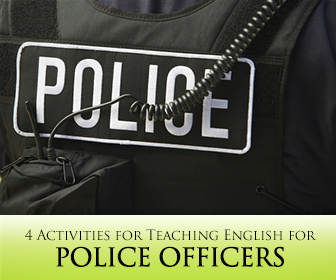“How Do You Say “Help!” in English?” 4 Activities for Teaching English for Police Officers


There are some useful tips which teachers can use in order to make it easier on themselves. When teaching ESP it is always important to remember that your students will usually have a basic grasp of the English language and they simply need to learn specific English that relates to their fields. Police officers are the hands of the law, and their duty is to serve and protect the people. As police officers, in English speaking countries or elsewhere, you will come across people who only speak English, typically tourists or retirees. Sometimes, getting information is the key and will help to solve a crime more quickly and your students may not always have time to wait for an interpreter. Today we will talk about some phrases and roleplaying activities you can use to help your students become more fluent. I will also give you some excellent vocabulary resources for teaching English to police officers.

One of the most common things that police officers will do when on car patrol or speed patrols will be to pull people over for various traffic offences. You can work through some roleplaying exercises with them where you pretend to be the driver who was pulled over and have them approach the car correctly. They will normally have training that teaches them the proper etiquette for pulling someone over and you can have them bring in the training manual given to them and work on the phrases given in the book. There are some phrases that will come in handy such as the ones listed below.
Another excellent roleplaying exercise which you can use to involve the students and get them to practice their English and deductive skills, will be to solve a mock crime. For a great sample, check out http://www.cyberbee.com/whodunnit/crimescene.html.
You can assign roles to different people, then have a team of your police students solve the crime. The roles of witnesses will be assigned to some students and you can have the police team question the witnesses and figure out “who done it.” Some questions you can encourage them to ask are listed below along with sample answers. You should also encourage them to ask any other questions they may feel like they need to ask to solve the crime.
Police officers are also very commonly regarded as people who are trustworthy to talk to and reliable when it comes to getting information from them. For this reason, tourists will often ask police officers for directions and for information about other things and problems they may have encountered. It is important that you let your students know about this and have them prepare for it by doing some simple roleplaying exercises with answering questions that tourists may ask. It is also important that they are fluent when it comes to giving directions to local hotels, landmarks, embassies, etc... Some questions they may encounter are:
Police officers will often need to ask for some form of identification so it is important that you teach them about the different types of identification card they may encounter, especially if they work somewhere with many tourists since every country has their own forms of identification. In some countries, people will carry a social security card, or a driver’s license, while in others people are required to use a national ID card, and in other countries, people will need to carry their voter’s registration cards. Some of the useful questions that you should teach your students include the following:
It is very important to remember that when you are teaching ESP that there will always be vocabulary lists that you will need to assign to your students. For some excellent vocabulary lists for police officers please refer to http://www.myvocabulary.com/word-list/law-enforcement-and-police-vocabulary/. This is a very comprehensive resource with 463 different terms that are applicable to the law enforcement and police field. It does not however, come along with definitions. It is a great resource to assign homework from to encourage the students to personalize and internalize the information.